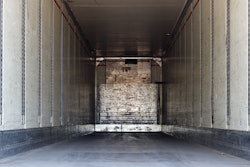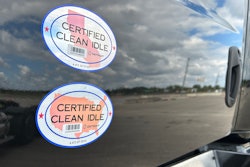Trucking news and briefs for Monday, March 24, 2025:
DOT boss gives New York 30-day extension to end congestion pricing pilot
In other trucking-related New York City news, U.S. Department of Transportation Secretary Sean Duffy is giving the state of New York and New York City officials an extra 30 days to wind down the city’s congestion pricing pilot program that began earlier this year.
Last month, Duffy penned a letter to New York Gov. Kathy Hochul to notify that the Federal Highway Administration’s (FHWA) approval of the Central Business District Tolling Program (CBDTP) had been terminated. In a follow-up letter, FHWA gave officials until March 21 to “cease the collection of tolls on Federal-aid highways in the CBDTP area.”
Duffy on Thursday, March 20, in a post on X called New York’s “refusal to end cordon pricing and your open disrespect towards the federal government is unacceptable.” He also signaled that the department is giving New York officials an additional 30 days to sunset the program.
With the extension, toll operations must end by April 20.
“Know that the billions of dollars the federal government sends to New York are not a blank check. Continued noncompliance will not be taken lightly,” Duffy concluded.
Hochul responded to Duffy’s post by re-posting her initial response to the termination -- “The cameras are staying on.”
Under the tolling program, large trucks are required to pay $21.60 to enter Manhattan below 60th Street with E-ZPASS, and small trucks are required to pay $14.40. There are discounts of 75% for nighttime entries to the Central Business District between 9 p.m. and 5 a.m. on weekdays, and 9 p.m. and 9 a.m. on weekends. Prices are set to increase incrementally to eventually reach the original pricing plan of $36 for trucks in 2031 and beyond.
The trucking industry continues to lobby for the end of the tolling program, with American Trucking Associations President and CEO Chris Spear and Trucking Association of New York President Kendra Hems writing to Duffy to reiterate their support for terminating the program.
“[T]he congestion pricing scheme was clearly designed to discriminate against trucks,” Spear and Hems wrote. “Unlike passenger vehicles, there is no viable alternative for trucks that must operate in the congestion zone to deliver the essential freight relied upon by businesses, the hospitality industry, and health care facilities, to name a few.”
Spear and Hems added that this leads to “higher prices for everyone living, working in, and visiting the city, with the potential for significant job losses.”
[Related: Trump DOT terminates New York City's congestion pricing program]
NYC launching paid truck parking pilot program
New York City is taking a stab at addressing the truck parking shortage with a pilot program to create 45 paid truck parking spaces within three of the city’s boroughs.
New York City Department of Transportation (NYC DOT) Commissioner Ydanis Rodriguez on Thursday announced the launch of the agency’s Overnight Truck Parking Pilot, which introduces a new metered parking option in select industrial business zones (IBZ) for commercial vehicles, including large tractor-trailers, in an effort to improve parking compliance and minimize overnight truck parking in residential areas.
The pilot will run for one year, encouraging businesses to ensure compliance with parking regulations while providing drivers with safe and convenient parking options during mandated rest periods.
"As the nation's largest city and a global hub for commerce, New York City depends on the movement of goods to drive our economy forward, but we must also protect neighborhood livability and street safety," said New York City Mayor Eric Adams. "This Overnight Truck Parking Pilot is a win-win that will add 45 spaces for tractor-trailers to communities long burdened by unregulated truck parking -- supporting our vital trucking industry, reducing illegal overnight parking in our residential communities, and providing truck drivers with the rest they need in a safe and regulated environment.”
The three IBZs selected for the pilot cover areas in three outer boroughs that have been plagued by illegal overnight parking, the city said. The pilot will cover corridors within the following IBZs:
- Flatlands/Fairfield IBZ in Brooklyn (Flatlands Avenue from Erskine Street to Fountain Avenue)
- Hunts Point IBZ in The Bronx (Ryawa Avenue from Manida Street to Halleck Street)
- Maspeth IBZ in Queens (56th Road from 43rd Street to 49th Street)
Truck operators will be able to use the ParkNYC app to pay for parking, which will be available 24 hours a day in eight-hour increments at $10 for each eight-hour session Monday through Saturday (there is no payment for parking citywide on Sundays).
To facilitate seamless parking payments, businesses are encouraged to sign up for a Park NYC Business Account, which will allow for all employee parking transactions to be managed centrally by the business. This account allows companies to manage all employee parking transactions through a single Park NYC wallet, simplifying the payment process for fleet operations. Businesses can ensure compliance with parking regulations while providing drivers with safe and convenient parking options during their mandated rest periods.
Truck operators may park for consecutive eight-hour periods, if they choose, the city noted.
[Related: Truck parking funding legislation reintroduced in Congress]
Bridgestone recalling Ecopia trailer tire
Bridgestone Americas Tire Operations (BATO) is recalling certain R123 Ecopia trailer tires, which may have been manufactured incorrectly with one of the three stabilizer ply belts applied in the wrong orientation.
According to National Highway Traffic Safety Administration documents, the recall affects approximately 1,185 of the tires in size 295/75R22.5.
As a result of the potential defect, the tires do not comply with Federal Motor Vehicle Safety Standard (FMVSS) number 119, "New pneumatic tires - other than passenger cars."
Recall documents note that the tires were manufactured at Bridegstone’s LaVergne, Tennessee, plant during the 35th week of 2024. A total of 24 tires were manufactured with one of the 3 stabilizer ply belts applied in the wrong orientation, and 18 of the tires have been contained with six still in the field.
Affected tires will exhibit an overly convex tread shape when fully inflated (i.e., the center of the tread will be significantly higher than both shoulders). Affected tires may also exhibit premature and/or irregular wear in the center/crown area of the tread after on-road use.
Bridgestone will replace the tires, free of charge. Owner notification letters are expected to be mailed May 13. Tire purchasers can contact Bridgestone customer service at 1-800-847-3272.











